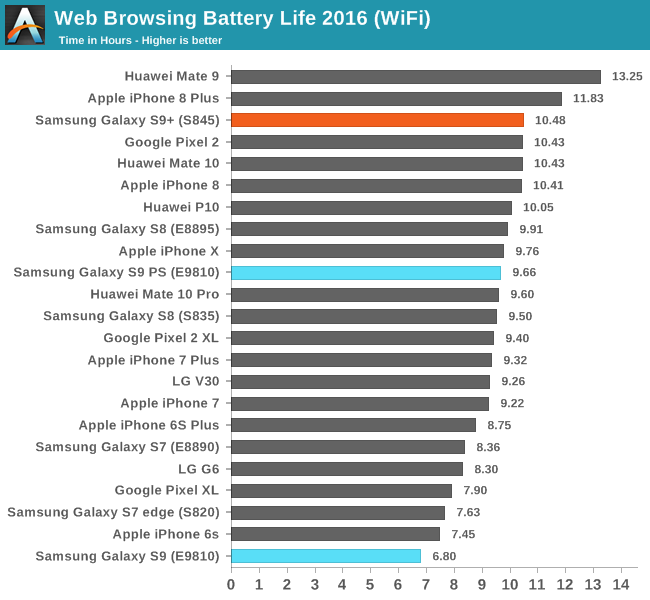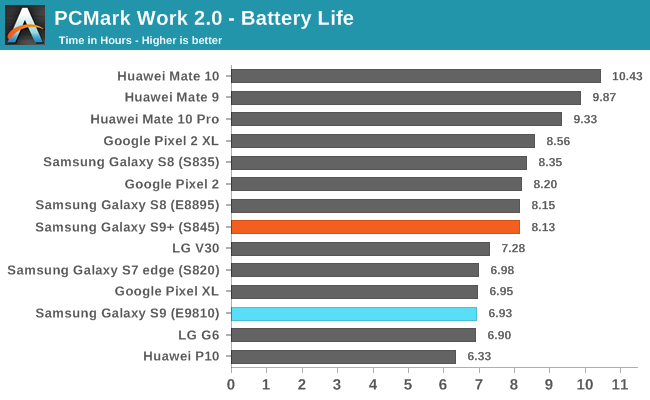The Samsung Galaxy S9 and S9+ Review: Exynos and Snapdragon at 960fps
by Andrei Frumusanu on March 26, 2018 10:00 AM ESTBattery Life - A Stark Contrast
We extensively covered the performance of the Snapdragon and Exynos Galaxy S9’s – what remains to be seen is how that performance affects battery life in our standard tests. Performance between the regular and larger Galaxy S9 doesn’t change, however battery life may differ based on the variant as the regular S9 sports a 3000mAh (11.55Wh) battery versus the 16% higher 3500mAh (13.47Wh) of the Galaxy S9+. Naturally the 14.2% bigger screen area of the S9+ offsets some of that advantage.
Unfortunately for this review we couldn’t get identical variants of the different SoC Galaxy S9s – our S9+ is a Snapdragon 845 unit while our S9 is an Exynos 9810 unit, so we weren’t able to execute a true apples-to-apples comparisons between the SoC variant, however as we’ll see the delta between the units is large enough that it won’t change the conclusion.
Our web browsing test tries to mimic real-world usage patterns of browsing websites. This includes iterating through a list of websites and scrolling through them. In this test, screen efficiency and battery size play a role, but also we balanced it so that it also sufficiently stresses the SoC (CPU, GPU and display pipeline) as well.

The Snapdragon 845 Galaxy S9+ posted excellent battery life in our test and lands only third to the iPhone 8 Plus and the Mate 9. Unfortunately we never tested the S8+ to see the generational difference, but it shouldn’t be too different from the S835 regular S8 at around the 10 hour mark.
The Exynos 9810 Galaxy S9 absolutely fell flat on its face in this test and posted the worst results among our tracking of the latest generation devices, lasting 3 hours less than the Exynos 8895 Galaxy S8. This was such a terrible run that I redid the test and still resulted in the same runtime.
I investigated the matter further to try to see if this was caused by the high energy usage of the M3 cores – and it seems it is. Enabling the “CPU limiter” (S9 PS result in the graphs) which is found in the battery optimisation options of Samsung’s firmware greatly throttles the M3 cores down to 1469 MHz, memory controller to half speed and also seemingly changes some scheduler settings to make them more conservative. This results in peak performance equal to the Exynos 8895- however the scheduler alterations also noticeably slow down UI responsiveness so it’s actually a worse experience. Nevertheless, backing off on performance results in regaining almost 3 hours.
This is such a terrible battery performance of the Exynos 9810 variant that it again puts even more clout into the new SoC. My theory as to why this happens is that not only do the higher frequency state require more energy per work done than competing SoCs – because this is a big CPU complex there’s also lots of leakage at play. The DVFS system being so slow might actually be bad for energy here as we might be seeing the opposite of race-to-sleep, walk-to-waste. The fact that Apple’s SoCs don’t have any issues with battery life in this test showcases that it’s not an inherent problem of having a high-power micro-architecture, but rather something specific to the Exynos 9810.

In PCMark the disadvantage of the Exynos 9810 S9 isn’t as pronounced as in the web test, however it’s again a regression to the Exynos 8895 S8 – all while not posting a meaningful performance advantage over its predecessor that might explain the lower battery life.
The Snapdragon 845 Galaxy S9+ fared relatively well, even though it’s not quite as good as other devices.
In my personal every-day usage I can’t saw that I noticed a massive disadvantage in battery life on the Galaxy S9, however my everyday usage is relatively light and I haven’t had enough time with the phone yet as a daily driver to make a final judgment. I did notice that the Exynos 9810 does shows signs of suffering in heavy tasks. Instances of Gmail syncing my inbox with a new account did once result in a warm phone while the Snapdragon 845 Galaxy S9 did not showcase this characteristic.
I can’t fault the Snapdragon S9+ in the time I had it, but again I haven’t had enough real time with it to really judge it subjectively. As far as AnandTech testing goes, the data speaks for itself and based on what I’ve seen I strongly do not recommend the Exynos variant of the Galaxy S9 in its current state, especially if you’re a regular user of heavy apps.
Over the coming weeks I’m planning to try to dive into the workings of the Exynos 9810 and post a follow-up article on whether it’s possible to improve both in terms of performance as well as battery life if one changes the way the SoC’s scheduler and DVFS works. In the eventuality that Samsung updates its firmware to resolve these large issues with the Exynos Galaxies, then we’ll revisit the matter as soon as possible.










190 Comments
View All Comments
robertkoa - Tuesday, July 3, 2018 - link
Yes. Has a great built in battery monitor that puts apps to sleep but they become immediately available.Also Location OFF unless using GPS ...Avoid having Apps and Sites give you notifications.
Avoid unnecessary extra tabs opened.
Screen brightness at 30% indoors.
I squeeze a lot of SOT on 4GLTE 6 hours browsing 40 minutes of calls 40 minutes of Youtube 20 minutes of emails on a charge.
Have not used Camera for a long time yet.
8 to 9 hours SOT.Qualcomm S9 USA not sure what people are doing who get half this.
I AM afraid to download the new .75GIG software update...why do they need .75GIG for security patches...?
Larger Operating System with constant security in deep background APPS could kill my battery life ...
peevee - Thursday, April 5, 2018 - link
WOW, A55 cores are so tiny compared to M3, one M3 cores takes as much silicon as 8 A55 cores. In the same amount of silicon, they could have had 1 M3 core and ~28-30 A55s. It would be just as fast in single-thread tasks but much faster AND more energy-efficient in multi-thread ones.peevee - Thursday, April 5, 2018 - link
Do I see it correctly that good old 820 is both most efficient and one of the fastest in most cases? Such a degradation!peevee - Thursday, April 5, 2018 - link
"we see the Snapdragon 845 within spitting distance of the Snapdragon 835’s energy usage throughout most of the workloads, sometimes winning and sometimes losing"Where 845 is winning in energy usage? What are you talking about? Either something is wrong with your graphs (color coding?), or 820 is significantly better than 835 which is significantly better than 845.
mkstowegnv - Thursday, April 5, 2018 - link
Thank you for putting all the work into this valuable review. But. You did not talk about GNSS - GPS, GLONASS, etc. (and AT has not had a story involving GNSS for 5 years). You can only do so much and it is another world of expertise, but it would be particularly valuable to look into GNSS for this phone. 2018 was supposed to be the year of phones with multifrequency GNSS leading to centimeter accuracy (and more to the point for the average user much better and faster performance in urban canyons, thick forests and other unfavorable environments and times). Broadcomm's BCM4775x series of L1, L5 chips was going to make this happen (but they have remained mum about which phones would use the chip). The problem is that Qualcomm SOCs are unlikely to incorporate their archrival's products, and all the leaks and previews of all the flagship phones for the next year indicate Qualcomm Snapdragon SOCs. Huawei uses non-Qualcomm but their just released p20 uses the previous generation, L1-only Broadcom chip. The only BCM4775x phone that anyone has seen and maybe the only one for the forseeable near future is the Exynos version of the S9+ which Techinsight's teardown and XDA hackers confirm has the BCM54772. It was not announced or documented by Samsung, and XDAers still don't know if it is picking up the L5 signal in an accessible way. What heroic figure(s) could possibly measure and compare GNSS accuracy in recent phones and possibly hack the Exynos S9+ to use L1 and L5 and get the best accuracy?KD323 - Thursday, May 17, 2018 - link
Thanks for the writeup! By the way, what do you think of these wooden phone cases for S9/S9 Plus?https://kaloadesigns.com/collections/galaxy-s9Peaches - Sunday, May 27, 2018 - link
Does these tests mean, that The E9810 with The CPU-Limiter from The Power Saving Mode activated , is as fast and more efficient than The E8895? BTW:awesome test and i love Hose detailed and fact-based you are.Taleim - Wednesday, May 30, 2018 - link
I hear that the may update improves battery life, any chance of running the tests again? CheersLodestone - Thursday, August 30, 2018 - link
Same here. Would greatly appreciate if you could run the exynos battery tests again to see if updates have improved the problem.CyberRain - Wednesday, August 8, 2018 - link
How to Catch a Cheating SpouseIt offers you not only to view the files on the device, but also download them on your personal computer.
The tool gives you absolute anonymity. Your spouse will never find out you spy on his/her cell phone.
There is no need on possessing the target device. You can spy on your Spouse remotely. The entire process does not need any physical access.
contact: Mobile Hack Expert